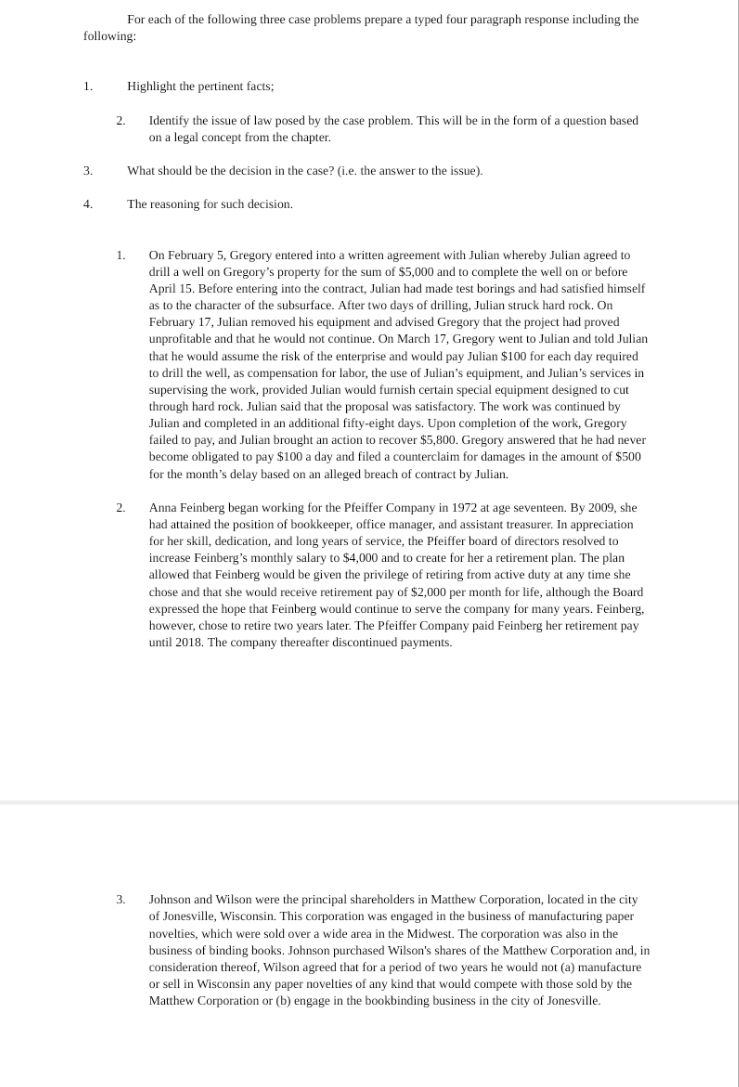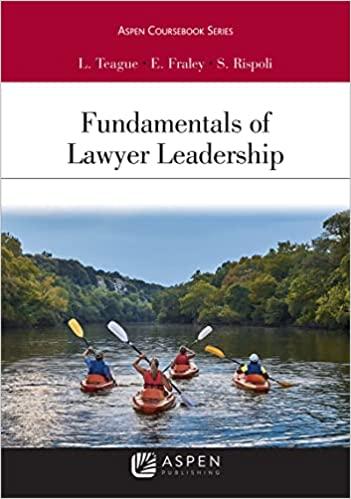please solve all
For each of the following three case problems prepare a typed four paragraph response including the following: 1. Highlight the pertinent facts; 2. Identify the issue of law posed by the case problem. This will be in the form of a question based on a legal concept from the chapter. 3 What should be the decision in the case? (i.e. the answer to the issue). 4 The reasoning for such decision. 1. On February 5, Gregory entered into a written agreement with Julian whereby Julian agreed to drill a well on Gregory's property for the sum of $5,000 and to complete the well on or before April 15. Before entering into the contract, Julian had made test borings and had satisfied himself as to the character of the subsurface. After two days of drilling, Julian struck hard rock, On February 17, Julian removed his equipment and advised Gregory that the project had proved unprofitable and that he would not continue. On March 17, Gregory went to Julian and told Julian that he would assume the risk of the enterprise and would pay Julian $100 for each day required to drill the well, as compensation for labor, the use of Julian's equipment, and Julian's services in supervising the work, provided Julian would furnish certain special equipment designed to cut through hard rock. Julian said that the proposal was satisfactory. The work was continued by Julian and completed in an additional fifty-eight days. Upon completion of the work, Gregory failed to pay, and Julian brought an action to recover $5,800. Gregory answered that he had never become obligated to pay $100 a day and filed a counterclaim for damages in the amount of $500 for the month's delay based on an alleged breach of contract by Julian. 2. Anna Feinberg began working for the Pfeiffer Company in 1972 at age seventeen. By 2009, she had attained the position of bookkeeper, office manager, and assistant treasurer. In appreciation for her skill, dedication, and long years of service, the Pfeiffer board of directors resolved to increase Feinberg's monthly salary to $4,000 and to create for her a retirement plan. The plan allowed that Feinberg would be given the privilege of retiring from active duty at any time she chose and that she would receive retirement pay of $2,000 per month for life, although the Board expressed the hope that Feinberg would continue to serve the company for many years. Feinberg, however, chose to retire two years later. The Pfeiffer Company paid Feinberg her retirement pay until 2018. The company thereafter discontinued payments. 3, Johnson and Wilson were the principal shareholders in Matthew Corporation, located in the city of Jonesville, Wisconsin. This corporation was engaged in the business of manufacturing paper novelties, which were sold over a wide area in the Midwest. The corporation was also in the business of binding books. Johnson purchased Wilson's shares of the Matthew Corporation and, in consideration thereof, Wilson agreed that for a period of two years he would not (a) manufacture or sell in Wisconsin any paper novelties of any kind that would compete with those sold by the Matthew Corporation or (b) engage in the bookbinding business in the city of Jonesville







